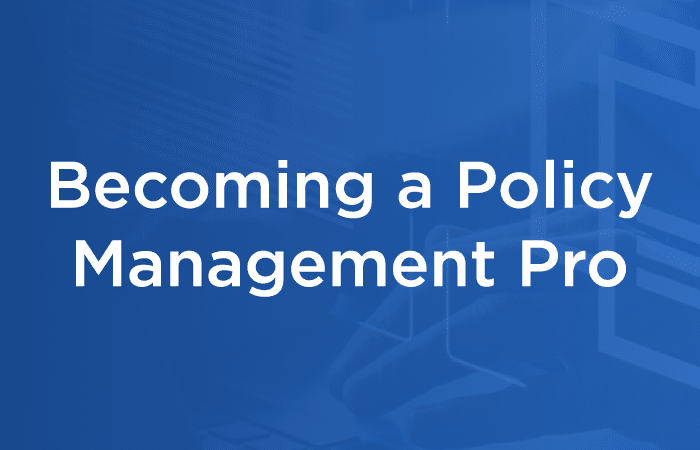Expecting the Unexpected: New Policy Challenges in a Hybrid Working World
The transition to hybrid working will dominate the thinking and time of many managers for the next couple of years. Whether it is pursued because it helps to right-size a company’s real estate, or to attract a wider range of skills, the operational realities are becoming paramount.
It is no longer about if, but how.
Hybrid working – seamlessly blending home working, office working and shared space working – clearly requires a basic level of technology to support it. These capabilities – secure VPN, SaaS-based applications, WebEx accounts for example – are well-tested.
It also needs a very solid understanding of what ‘good’ looks like for everything else, from how people conduct themselves away from the office, how they maintain data security away from the office, how they meet and maintain performance standards and much else. These issues, covered under policy management, have been the subject of much focus by the HR, IT, and security functions in the business throughout 2020 and 2021.
Part of our Becoming a Policy Management Pro series
Despite these excellent foundations, the move toward comprehensive hybrid working in the longer term presents some significant and unanticipated implications for policy management. They cover issues such as career development, work/life balance, designing performance objectives and metrics, drug and alcohol use, health and safety issues – the list goes in.
Let’s explore a few examples and consider some of the policy management implications.
New policy management complexities
Companies will have a policy on drink and drugs in the workplace, deeming them both inappropriate. However, consuming at home is widely accepted, so what are the implications for home working?
Is it reasonable for people to work under their influence, and if so to what extent? How reasonably can a company enforce its requirements, while recognising the need for privacy? How does an organisation manage someone who works from home regularly but who appears to work under the influence?
Staff management and development is also important, too. In a hybrid model, beyond hitting output objectives, what do ‘acceptable’, ‘good’ and ‘exceptional’ performances look like? How are they defined, measures and monitored? How is under performance best addressed and over performance best rewarded? What happens if someone feels their career is being harmed by their working from home, when it has been approved by the business?
There are financial implications for hybrid working as well. Employer liability insurance means that staff are insured whilst travelling to and from work, as well as at their office. How does this work for staff who spend time in their own home? How do companies handle the health and safety obligations involved in this insurance, when people work at home or in a shared space environment?
There are even issues surrounding the actual definition of ‘work’ itself. Some staff will prefer normalised ‘time blocking’, so they are available to work and can be contacted from 9am to 6pm as normal. Others will prefer ‘time slicing’ where they are available to work and communicate between, for example 7am and 10pm, but only for a selection of hours in that time.
In this situation, how does an organization define the working day? How does it enforce it? How does it best manage expectations so that people do not feel the obligation to be available 24/7, which can impact their personal and professional lives?
[bctt tweet=”Companies will have a policy on drink and drugs in the workplace, deeming them both inappropriate. However, consuming at home is widely accepted, so what are the implications for home working?“]
A range of conundrums and conflicts
These questions – and there will be many others – will create a range of conundrums and conflicts about how best to define, manage and enforce policies across the business. Much thought will be put into the answers to these questions, which will inform the adaptation of existing policies and the creation of new ones, which staff will need to be educated and assessed on, on a regular basis.
In the light of real-world use, operational ‘pushback’ as well as legal challenges, these new and updated policies will likely need to be revised, reviewed, and published on a regular basis, for quite some time before all the wrinkles, inconsistencies and omissions are eventually addressed. Companies will need to expect the unexpected.
These issues will place a premium on effective policy management solutions, as policy managers, senior managers and other members of staff will need robust systems and processes to help them navigate the complex challenges. Among the features such a solution should deliver?
- A centralised policy library will help everyone access the latest guidance on important issues, while also helping policy managers ensure only the up-to-date documents are in circulation.
- Workflow capabilities allow for policy enhancements to be drafted, reviewed, and published swiftly and efficiently.
- Automated training and assessment capabilities allow for staff to remain current on changing requirements, at a pace that that suits they way they work most effectively.
- Reporting tools provide visibility at Board level that show staff are following the right procedures, despite being widely dispersed.
Taking policy management to the next level
Recognising that hybrid working creates significant policy management challenges has spurred the GRC industry think tank The Open Compliance and Ethics Group’s (OCEG) launch its Policy Management Pro initiative. It delivers policy management frameworks and tools to help senior managers and policy practitioners to raise their policy management game.
Mitratech is collaborating with OCEG to bring a practical perspective that helps management and staff address the issues explore earlier. Watch this webinar to see how Mitratech is helping industry professionals use technology to enhance their compliance and policy management, and become Policy Management Pros.

Mitratech provides an array of technology solutions that help businesses deliver powerful policy management capabilities that are proven, robust and swift to implement. Our comprehensive policy development, review, and assessment capabilities, supported by workflow automation allow companies to address the policy implications of hybrid working efficiently and effectively, without worrying about the systems that deliver it. Find out more.




